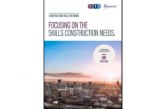
In the viewpoint column of PBM’s March 2021 edition, editor Paul Davies looked ahead to the coming budget and queried the longer term prospects of a nation transformed or one simply clamouring to return to what went before...
The Groundhog Day-esque pandemic holding pattern continues, yet the success of the vaccination programme means that the clamour to ‘reopen the economy’ grows ever louder. We’ve experienced false dawns before so, as we have discussed numerous times before, a headlong rush out of lockdown can cause greater problems in the future, but the rapid rollout of the vaccines gives tantalising and more tangible hope.
When the pandemic first took hold there was much talk of how its impact could lead to a longer term ‘new normal’ of something different to what went before. Now, perhaps as an inevitable consequence of the general ‘lockdown fatigue’ that has enveloped the nation, it just seems to be an urgent desire to get back to where we were in February last year…
Yet for all the devastating effects that Covid-19 has wrought on great swathes of society and the economy, this is a conversation that will need to be revisited. The true impact on the state of the nation’s finances as a consequence of the pandemic and the government’s essential financial intervention is yet to be felt, whilst certain structural weaknesses in the economy have been exposed.
With an economy so dependent on consumer spending, the pace of recovery will be tempered by consumer confidence. Vaccination success won’t necessarily put an end to working from home, so what of the effect on the ‘commuter economy’? Jobs already lost will not necessarily come back, and how can our town centres and high streets be reimagined following the likely permanent surge in online shopping?
For a sustained recovery, truly innovative thinking will be required across the board with bold and imaginative policy surely a necessity. With the Budget set for 3 March, it will be interesting to consider the Chancellor’s first major address towards the post-pandemic future and an altered economic landscape post-Brexit.
We know that the construction sector in general has been placed at the heart of the Government’s recovery plan, so we are keen to hear more from Number 11 on Budget Day. As noted on our News pages this month, the Federation of Master Builders is but one industry voice to call for a VAT reduction on home improvement works and support for a National Retrofit Strategy to sustainably upgrade the nation’s homes.
For the merchant sector specifically, the pandemic restrictions have greatly challenged one of its previously heralded USPs — close contact and personal relationships with its customer base. Yet as we have regularly written over the last year, merchants adapted quickly in the early phase of the crisis with digital solutions deployed at great pace to redress the balance of limited interaction at the trade counter.
And as the articles in our Information Technology feature reveal later in the issue, this will doubtless form a permanent development within the industry, yet simply having an online presence is not an answer in isolation. Customer perceptions and requirements have changed; they have become more at ease researching and ordering online, breaking long-established habits and so loyalty will have to be fought for.
Here, the greater access to vital data from burgeoning online sales will be a key tool for the sector, even when the doors to the branch are once again fully opened up.
“For a sustained recovery, truly innovative thinking will be required across the board with bold and imaginative policy surely a necessity.”





